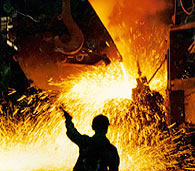 The Ministry of Foreign Trade and Economic Cooperation (MOFTEC) expressed "deep regret" at the United States' headstrong decision to impose safeguard tariffs on steel imports despite angry global opposition.
The Ministry of Foreign Trade and Economic Cooperation (MOFTEC) expressed "deep regret" at the United States' headstrong decision to impose safeguard tariffs on steel imports despite angry global opposition.
China and the US are expected to hold talks soon on the issue and the two sides are discussing the specific time and place, said the ministry.
China has applied to the World Trade Organization (WTO) to arrange talks with the US on March 14. The US must decide on the time and place of the talks together with China within 10 days, according to WTO rules.
US President George W. Bush slapped safeguard tariffs of 8 per cent to 30 per cent on several types of imported steel on March 5 in an effort to help the ailing US industry. The tariffs take effect on Wednesday.
The countries hardest hit by the tariffs include Japan, the European Union, the Republic of Korea, China, Ukraine, Brazil and Russia.
The EU Commission started the WTO dispute resolution procedure last week and Japan announced on Monday that it will complain to the WTO immediately after the US steel tariffs take effect.
The tariffs exempt countries that have signed free trade agreements with the US - Canada, Israel, Jordan and Mexico - and developing countries with only limited steel exports to the US.
Australia has negotiated an exemption to most of the tariffs, with Prime Minister John Howard saying on March 11 that 85 per cent of Australian steel exports to the US would not be affected by the new tariffs.
Zhang Hanlin, a professor with the Beijing-based University of International Business and Economics, said China intends to seek compensation for losses incurred on its iron and steel companies through talks with the US.
In accordance with WTO rules, China could rightfully ask the US to increase its imports of other products such as textiles from China or lower its tariffs on these products as compensation, he told China Daily in an interview.
But more probably, China will be able to force the US to lift its steel tariffs within a year, he said. Some other analysts guessed China will retaliate by imposing safeguard tariffs on farm products imported from the US if it is not granted satisfactory compensation.
US farm products are very competitive on the global market and are expected to flood into China after the country's WTO entry, dealing a heavy blow to local farmers.
During the Fifth Plenary Session of the Ninth People's Congress, Premier Zhu Rongji said that increasing farmers' income is a major concern of the Chinese Government and jokingly proposed a retaliatory 30 per cent tariff on soybean imports from the US to protect Chinese farmers.
(China Daily March 20, 2002)
